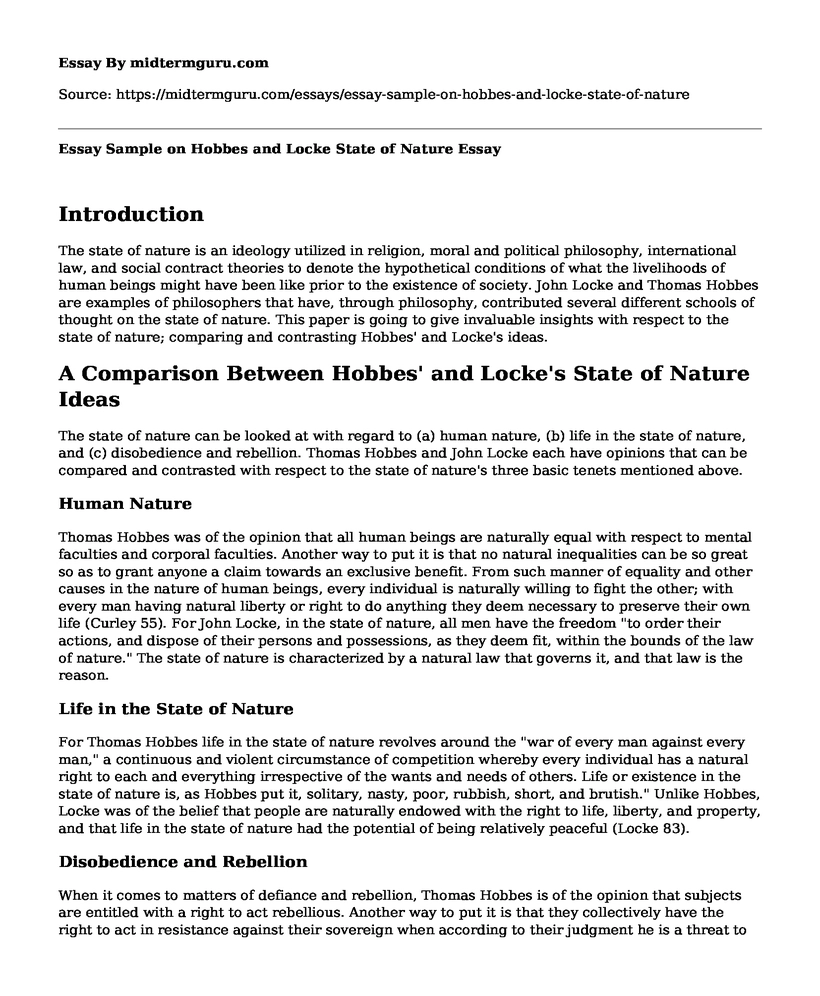Introduction
The state of nature is an ideology utilized in religion, moral and political philosophy, international law, and social contract theories to denote the hypothetical conditions of what the livelihoods of human beings might have been like prior to the existence of society. John Locke and Thomas Hobbes are examples of philosophers that have, through philosophy, contributed several different schools of thought on the state of nature. This paper is going to give invaluable insights with respect to the state of nature; comparing and contrasting Hobbes' and Locke's ideas.
A Comparison Between Hobbes' and Locke's State of Nature Ideas
The state of nature can be looked at with regard to (a) human nature, (b) life in the state of nature, and (c) disobedience and rebellion. Thomas Hobbes and John Locke each have opinions that can be compared and contrasted with respect to the state of nature's three basic tenets mentioned above.
Human Nature
Thomas Hobbes was of the opinion that all human beings are naturally equal with respect to mental faculties and corporal faculties. Another way to put it is that no natural inequalities can be so great so as to grant anyone a claim towards an exclusive benefit. From such manner of equality and other causes in the nature of human beings, every individual is naturally willing to fight the other; with every man having natural liberty or right to do anything they deem necessary to preserve their own life (Curley 55). For John Locke, in the state of nature, all men have the freedom "to order their actions, and dispose of their persons and possessions, as they deem fit, within the bounds of the law of nature." The state of nature is characterized by a natural law that governs it, and that law is the reason.
Life in the State of Nature
For Thomas Hobbes life in the state of nature revolves around the "war of every man against every man," a continuous and violent circumstance of competition whereby every individual has a natural right to each and everything irrespective of the wants and needs of others. Life or existence in the state of nature is, as Hobbes put it, solitary, nasty, poor, rubbish, short, and brutish." Unlike Hobbes, Locke was of the belief that people are naturally endowed with the right to life, liberty, and property, and that life in the state of nature had the potential of being relatively peaceful (Locke 83).
Disobedience and Rebellion
When it comes to matters of defiance and rebellion, Thomas Hobbes is of the opinion that subjects are entitled with a right to act rebellious. Another way to put it is that they collectively have the right to act in resistance against their sovereign when according to their judgment he is a threat to their survival (Rohr 26). On the flip side, John Locke believed in law and order even with respect to civil disobedience. He was of the opinion that civil disobedience should be well within the machinations of the law and should revolve around ousting one legislature and putting in place another. Another way of looking at Locke's school of thought is that there is a law which transcends the laws of the state. In the event that this higher and natural law conflicted with the laws of the state, an individual had the right to go against the laws of the state (Locke 35).
Conclusion
In summary, it is worth mentioning that both John Locke and Thomas Hobbes do well to denote the hypothetical conditions of what the lives of individuals may have been like before organized society came into being. Through their schools of thought, we can appreciate the organized society that we have today. Governments too are able to realize the power and influence of the people.
Works Cited
Curley, Edwin. "The state of nature and its law in Hobbes and Spinoza." Spinoza and Law. Routledge, 2017.79-99.
Locke, John. Second Treatise of Government: An Essay Concerning the True Original, Extent and End of Civil Government. John Wiley & Sons 2014.
Locke, John. John Locke: essays on the law of nature: the Latin text with a translation, introduction, and notes: together with transcripts of Locke's shorthand in his journal for 1676. Oxford University Press, 2002.
Rohr, John. Ethics for bureaucrats: An essay on law and values. Routlegde, 2017.
Cite this page
Essay Sample on Hobbes and Locke State of Nature. (2022, Sep 20). Retrieved from https://midtermguru.com/essays/essay-sample-on-hobbes-and-locke-state-of-nature
If you are the original author of this essay and no longer wish to have it published on the midtermguru.com website, please click below to request its removal:
- Case Studies Analysis: Communication Between the Patient and the Health Provider
- Paper Example on Verbal Judo in Correctional Institutions
- Compare and Contrast Essay on Feminist Supervision and Gender Role Conflict
- Deborah Tannen: How Language Affects Relationships - Essay Sample
- Theoretical Perspective Explaining White Collar Crime
- Primary & Secondary Groups: A Comparison - Essay Sample
- Faculty-Student Communication and Its Impact on Motivation and Trust - Essay Sample







